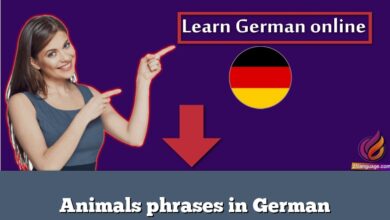4 Steps to Learn German Fast

Learning German as any language is a journey full of stops and starts, and learning German is no different. In fact, German has a reputation for being one of the more difficult European languages to learn. With all the long words,
grammar rules and different options for saying the same thing, learning German can feel overwhelming. But don’t let this demotivate you! There are also lots of reasons why learning German might be easier (and quicker!) than you think! So, how can you learn German fast?
Is it possible to learn German fast?
Peoples’ learning goals vary, but (generally speaking) most language learners want to reach some level of fluency. But what does fluency mean? To be able to speak like a native speaker/local? To be able to hold a conversation?
To be able to move to a country and get by? Maybe you simply want to manage while you’re on holiday. Regardless of where your goal post is, there are some tricks you can learn that will speed up your journey to mastering conversational German.
A quick note: whether you really can learn a language fast is debatable. It depends what you mean by ‘learn’ and ‘fast’. If you want to get from nothing to perfectly fluent, you’re not going to get there in a month. But you can learn German in a time-effective way Below are some tips on how to save on effort rather than time.
1. Work with what you know
See if you can understand the following paragraph…
What are you doing this Wochenende? Buying some Schuhe? Will you babysit your Schwesters blond Baby? Are you going to watch a Film in your Haus in a Minute? On your Computer with your Cousine? Maybe have some Glühwein? (Ok, the last one isn’t exactly a true friend, nor is it the behaviour of a good baby-sitter, but you get my point.)
German and English have a lot of ‘true friends’, which means they have a lot of words are (or are nearly) identical. The English language has Germanic roots, and although it has been influenced by Romance languages, there are still enough similarities that make learning German easier than you might think. Here you can find a list of some of German’s many true English friends.
2. Learn the 1,000 most common German words.
If you want to learn German quickly, don’t waste time learning words you’ll rarely hear or use. Learning 1,000 words might sound intimidating, but as stated above, a lot of the words sound like words you already know! Here is a link to the most common German words. Get learnin’!
3. Do something every day
The key to getting better at anything fast is repetition. Whether it’s reading, writing or speaking, doing something every day will show you rapid improvement. A daily activity could be choosing two of those 1000 words and making sentences out of them. You can download apps or play games. The more fun the activity is, the easier it will be to stick to.
4. Speak from day 1
Now we’re getting to the good stuff!
Speaking is probably the most intimidating part of learning any language. But it doesn’t have to be. If you want to learn German fast, start by learning easy, conversation-filler words. I’m not suggesting you dive into a conversation about philosophy or politics in German, but if someone strikes up a chat about your weekend, you’re going to be able to get by with these phrases. Let’s look at the dialogue below…
Friend: “Hey!”
German learner: “Na?”
Friend: “Lange nicht gesehen!”
German learner: “Ja, ne?”
Friend: “Bist du öfter hier?”
German learner: “Nee!”
Friend: “Warst du schon mal hier?”
German learner: “Nein, nie.”
Friend: “Wirst du nochmal her kommen?”
German learner: “Nö!”
Friend: … (awkward silence)
German learner: “Und Nu?”
Friend: “Naja, ich weiß es auch nicht.”
Did you follow? Let’s have a look at what those similar-sounding syllables mean…
Na – informal for ‘How’s it going?’
Ja, ne? – Question like ‘gell’, ‘oder’, ‘stimmt’. It’s a bit like ‘huh?’
Ne – Informal for nein
Nee – also informal for nein
Nie – Never
Nu – now (‘im Nu’ means in the blink of an eye)
Naja – expresses uncertainty or indifference
Learning these easy words can help you at least sound like you are following the conversation.
How to close a German conversation
Na dann. – Well, then.
Da muss ich eine Nacht drüber schlafen. – I’ll have to sleep on it.
Interessant. – Interesting.
Ich schreibe dir dann / ich rufe mal durch. – I’ll message you then / I’ll call through.
Da kenne ich mich nicht aus. – I don’t know my way around there/I don’t know enough about this topic
So there you have it! Four simple but effective steps that save time when learning German. So what are you waiting for? Los geht’s!





























